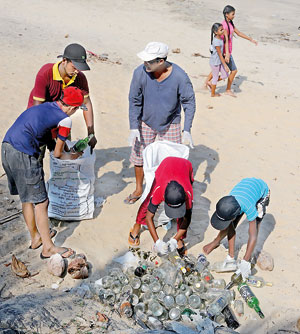News
Sri Lanka among the ‘dirty five’

People engaged in a recent cleanup and awareness programme on a beach in Negombo. Pic by Amila Gamage
A study by the US based Business Times magazine has ranked Sri Lanka among the top 20 countries that pump 80% of the global 13 tons of plastic waste into the sea. Accordingly every Sri Lankan throws 5.1 kilos of plastic and bottles.
Sri Lanka has been grouped with populous nations like Indonesia, the Philippines, Vietnam and China which tops the list.
The study also said that for every person in Sri Lanka 0.299 kg of plastic is mismanaged and the country generates an average of 5,163,689 kilos of plastic waste per day.
Although experts in the field here argued that the figures were disputable they all agreed on the need to take steps to cut down on the use of plastics.
Environmentalist Ravindra Kariyawasam said the country needed an effective solid waste management strategy. He said the indiscriminate use of plastics and shopping bags was still at a high despite efforts by the government to reduce their use.
In January this year president Maithripala Sirisena revived a dormant law introduced in 2007 that all polythene used should be more than 20 microns in thickness. However, four months after the ban, bags below 20 microns are still being manufactured and distributed.
The Central Environment Authority (CEA) which is authorised with monitoring manufacturers and distributors of polythene said it was difficult to gauge the thickness of the polythene without proper machinery and many manufacturers were getting away scot free.
CEA Chairman Prof. Lal Dharmasiri said that with only four machines available, it was not possible to carry out effective raids. “We need more machines. We have ordered 20 more machines and are awaiting them,” he said.
It is learnt that many small businesses manufacture bags in their own backyard. The Bio Diversity Conservation and Research Circle said the habit of using polythene bags will be difficult to stop overnight. “It is important to introduce an alternative form which is cheap and easy to use,” Chairman Supun L. Prakash said.
He said that the process should be done in stages starting with shopping bags, lunch sheets and then plastic bottles. He also said it was important to educate people on responsible waste disposal methods. “Children should be educated in school about safeguarding the environment and proper disposal of garbage.”
The Sunday Times was told that the lack of funds was a major drawback in proper waste management. CEA, Director of Solid Waste Management Division Ajith Weerasundera said local bodies responsible for the collection and disposal of garbage were financially strapped. “They have no proper technology in disposing garbage, and no land to dump the garbage,” he said.
Mr. Weerasundera said garbage has to be dumped in specially constructed sanitary landfills but local authorities are dumping waste on bare land. “They have no proper dumping grounds. Even the Colombo Municipal Council (CMC) has no proper dumping yard,” he said.
Another area the government has to look into is educating the people. “The 3Rs – Reduce, Reuse and Recycle, should be drilled into their minds he said.
Also there is a necessity to fund local bodies to streamline and enhance the technicality of the collection process. “Around 700 metric tonnes of waste is collected daily,” he said.
Meanwhile, the private sector also has got involved in the garbage collection process. CEA, Director, Waste Collection Division, Sarath Kumara Bandula said that 140 private collectors have registered with the CEA online. The CEA in a bid to enhance the process has given crusher machines to selected companies to turn hard plastic to simple grains. “We want to achieve 80 % recycling capacity like Germany. Right now we recycle around 40% plastics,” he said.
In addition, Mr. Bandula said that the CEA was planning to establish 25 recycling centres in the country especially in places where crowds gather. Of these eight including centres in Kurunegala, Balangoda, Anuradhapura, Matara, Kandy, Nuwara Eliya and Jaffna were in operation. Solid waste collection centres have also been established islandwide. Already 50 Municipal Councils collect solid waste and degradable waste separately.
| Steps have been taken to mitigate problem The Marine Environment Protection Authority said the data put forward by the Business Times Magazine was primitive and that the study was done in 2010. Chairman, Rohana Perera said that for the past five years several programmes have been carried out by the Authority and they have helped to reduce marine pollution levels around Sri Lanka. In addition, he said, schoolchildren especially in coastal areas were being educated on keeping the marine environment clean. He said marine teams carried out workshops in schools. He said under this awareness programme 200 schools have been chosen and students and teachers are being taught about marine environment, conservation and importance of disposal of waste. He said on a positive note the magazine study projects that in 2025 the pollution levels emitted by Sri Lanka will decrease considerably. |

